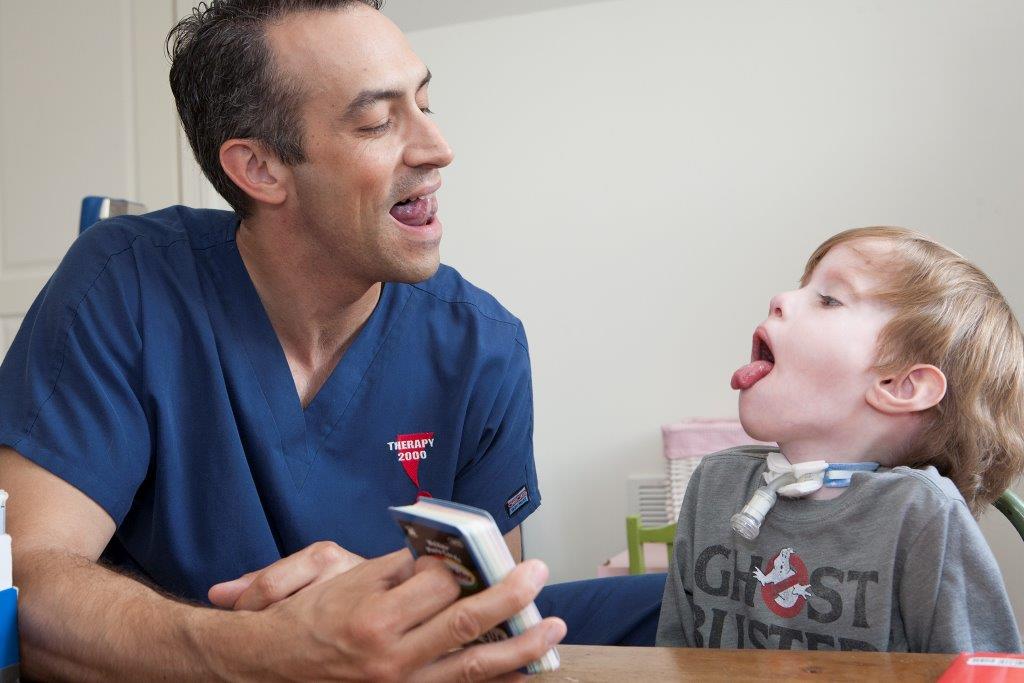Speech and Language: The Dynamic Duo
 Getting Down to Basics
Getting Down to Basics
What is the difference between speech and language? They are different skills that work together to create and facilitate communication. Both are early developing childhood skills. Picture a baby learning sounds – “goo – goo; ga-ga; ma ma ma ma ma; ba ba ba ba ba ba.” Their cooing and babbling is actually a wondrous voyage of discovery, as they mimic what they have heard from the adults and children around them.
Here is some information concerning important differences between speech and language that may be useful if you know or suspect a child is having speech or language difficulties.
Speech
Speech is the sounds that people make to communicate: rhythm and pattern, vowels and consonants, and the quality of the sound.
Starting from infancy, speech development generally follows a regular pattern if the child is able to hear the sounds that they themselves and others make. With a severe loss of hearing, the child’s inability to hear someone speak translates into developmental difficulties with speech skills.
As with most bodily functions, speech is a complex operation. The movement of the mouth and its neighboring body parts – tongue, chin, lips, teeth, throat and jaw – change the air stream and produce sound. Signals from the brain enable the parts of the mouth and the vocal chords to move and create a particular sound. To consider how large an impact they play on speech, think about how lip reading enables others to “hear” even without sound.
Language
Language is any accepted, structured, symbolic system for interpersonal communication composed of sounds arranged in an ordered sequence to form words. There are rules for combining these words into sequences or strings that express thoughts, intentions, experiences, and feelings.
There are several types of language as well:
- Expressive – ability to communicate via the spoken or printed word
- Prelinguistic – behaviors that are thought to precede the acquisition of true language; e.g., crying, cooing, babbling
- Receptive – words one understands.
Since the best way to build a child’s language skills is early and abundant exposure to people using a specific language. Most experts agree that children easily learn a language before the age of seven. If a child is unable to hear or understand what is being said their ability to learn a language is compromised. Another drawback can be limited exposure to many different words during the first year and a half of life, which hinders fundamental development of language processing and vocabulary skills.
Speech and Language: The Dynamic Duo
While two different concepts, speech and language overlap in many areas and both are necessary for clear communication. If one is not fully developed, it can have an impact on the other. This is where speech-language professionals can help you identify the problem, answer your questions, calm your fears if necessary and help to develop a plan of action that will be beneficial to the needs of your child and your family.
With any child who has communication difficulties, it is important to know if the difficulty lies with language skills or speaking (speech) skills. Parents may be able to assist them on their own, but it is always a good idea to seek the opinion of a professional such as a speech-language pathologist or audiologist.
Speech (Speaking)
“The weal twouble is wunning fast awound the playgwound.” Some children may have trouble with being understood. Pronouncing an R sound like a W is a common deficient speech skill. The correct words in the correct order are used; it’s the pronunciation that needs work. For this, you can help your child practice the correct pronunciation of the R sound.
Language
The meaning of what a child is saying may be difficult to understand if they have trouble with language. If the sentence comes out like this: “The real trouble is ran around the playground,” the words are correctly pronounced but not used correctly. For this, you can help your child by repeating the sentence using proper grammar: “The real trouble is running around the playground.”
The important thing for all parents to know is that speaking to your child from birth is critical to his or her language and speech development, whether it’s making nonsense sounds for a baby to emulate or reading aloud to your toddler. If you suspect there may be a problem, contact your pediatrician, a speech-language pathologist or an audiologist for help. Your child’s ability to communicate is too important to overlook any suspicions or worries!
Does your child need to develop his/her speaking and listening skills? Consider the speech-language services at SLI. Contact us today for more information.
Helpful websites: